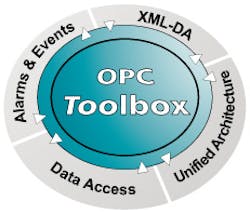OPC UA Toolkits Support Multiple Operating Systems
Softing, the world leader in providing conformant OPC development tools, has announced its new OPC Unified Architecture (UA) Toolkits that will be available in the fourth quarter of 2009. The latest version of the OPC UA Toolkit set support the following operating systems out-of-the-box: Windows, VxWorks, and Linux.
Softing's Toolkits are currently the only products available that include all necessary OPC libraries to develop OPC Clients and Servers based on the Classic OPC Data Access (DA), Alarms & Events, XML-DA, and the OPC UA specification.
With more than 1,600 companies relying on Softing’s OPC development kits to generate thousands of compliant OPC products, Softing holds the lion’s share of the world-market for OPC development tools.
The OPC UA Toolkits are designed to assist software engineers to elegantly implement effective OPC Clients/Servers or to embed high-performance OPC UA technology directly into target devices like programmable controllers (PLCs), distributed control systems (DCSs), or operator panels. One of the major advantages of OPC UA is its independence from the Windows operating system. Softing’s engineering team took advantage of this fact and has already ported its OPC UA software to Linux and VxWorks.
The new OPC UA Development Kit fully integrates with Visual Studio and has two flavors:
• OPC UA Toolkit C++: This extremely powerful and universal development kit is designed to implement dedicated, high-performance OPC products for any non-Windows operating system and for embedding OPC UA technology into any target device.
• OPC UA Toolkit C# and .NET: This development kit guarantees the rapid development of conformant OPC UA client or server products for the Windows operating system and seamlessly integrates with standard Windows development tools like Visual Studio 2008.
Softing’s uncompromising commitment to quality is reflected in the fact that its OPC UA software has been stringently field-tested by several customers with high performance demands before being released. During this process, Softing continually optimized the software to achieve the outstanding performance and robustness level demanded by Softing’s quality standards. In addition, Softing’s commitment to continually improve its OPC toolkits will protect the investment of OPC developers using Softing’s toolkits.
Many companies have factored in Softing’s extensive experience with embedding OPC technology into industrial components. For example, Schweitzer Engineering Laboratory (SEL) stated: “Softing’s OPC kits are essential when it comes to developing Web applications. With Softing’s development kits, our developers were able to focus on their project goal instead of OPC-specific components of the application.”
The following is a summary of benefits the OPC Toolkits from Softing offer:
• Assures 100% OPC Compliance: The use of an OPC Toolkit assures that your OPC product is compliant with the latest OPC specification. Softing is an active member of the OPC UA Compliance Test Tool (CTT) working group and frequently tests its OPC Toolkits in OPC interoperability workshops.
• Clear Migration Strategy: A built-in upgrade path for OPC products developed with Softing’s OPC Toolkits V4.2x provides for an easy migration to the new OPC UA technology without any noteworthy changes to the products.
• Reduces Time-to-Market and Development Costs: OPC Toolkits significantly reduce the development time of an OPC Server or Client by allowing the developer to concentrate on transmitting data and not on learning the ins and outs of the new OPC UA technology.
• Reduces Maintenance Cost: Softing's OPC Toolkits include a 1-year maintenance agreement. The benefits of this agreement include developer-to-developer support and free updates to the OPC Toolkit to ensure continual compliance to the ever-evolving OPC specification. Subsequent-year maintenance agreements are available to ensure that the software will always be up-to-date.
• Improves Data Throughput: OPC products that are based on Softing's toolkit libraries consistently outperform competing OPC products since Softing’s libraries have been uncompromisingly optimized for robustness and data throughput.
• Development Services: Softing’s experienced software development team can help to embed OPC UA technology into a target device or develop an OPC product (OPC Client or Server) for Ethernet, fieldbus or serial protocols. Softing is a recognized OPC Competence Center.
For more information on how Softing can assist you, please visit www.softing.us.

